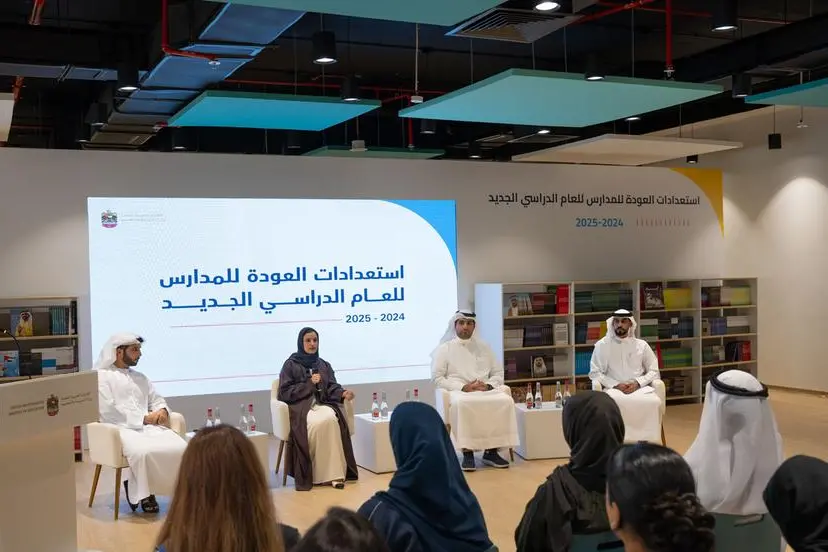PHOTO
The UAE Ministry of Education (MoE) has confirmed its comprehensive preparedness for the 2024-2025 academic year, reaffirming that public schools are ready to welcome students back on Monday, 26th August 2024, as a result of the concerted efforts of all teams at the MoE, that worked diligently to ensure an ideal and seamless start to the new academic year.
The announcement was made in a press briefing organised by the Ministry in collaboration with the UAE Government Media Office, with the attendance of Sarah Al Amiri, Minister of Education; Mohammed Al Qasim, Under-Secretary of MoE; Sulaiman Al Kaabi, Executive Director of the Students’ Wellbeing Sector; and Dr. Omar Al Dhaheri, Acting Executive Director of the Corporate Services Sector, along with representatives from local media.
During the briefing, Sarah Al Amiri emphasised that the MoE put proactive plans in place prior to the conclusion of the previous academic year. These comprehensive plans, developed in close collaboration with relevant entities, were designed to ensure all preparations were completed well in advance of the new academic year and focused on enhancing the school environment, upskilling educators, and improving infrastructure and support services.
In her address, Al Amiri also announced the introduction of comprehensive updates to student assessment policies across all educational levels. These evidence-based policy updates are grounded in best practice, and intended to enhance the quality of educational outcomes, in line with the UAE leadership’s aspirations. The updates include the assessment policy for the weightings of the three terms, and the percentages for formative and central assessments, among other changes.
During the briefing, Sarah Al Amiri explained the details of the weightings for the next academic year, noting that they will help in develop students’ academic journeys. The evaluation weightings for students in Cycles 2 and 3 have been modified as follows: 35 percent for the first term –since it is the longest academic term; 30 percent for the second term; and 35 percent for the third term. She noted that the weightings have been adjusted in accordance with the number of school days and expected outcomes for each term, ensuring a more balanced and indicative evaluation process for students.
Al Amiri also mentioned that for students in Cycles 2 and 3, the Ministry of Education has modified the percentage of the formative assessment to 40 percent, while setting the percentage for the central assessment conducted at the end of each terms to 60 percent. These updates in assessment weightings are based on an analysis of student results, which revealed the importance of continuous assessment and measurement of academic and skill-development outcomes throughout the year, rather than relying solely on end-of-term central exams.
She also explained that the central exam for Cycle 2 students in the second term has been replaced with a project-based assessment that focuses on skill measurement, and helps students put theoretical knowledge into practice, further enriching their learning outcomes.
Al Amiri also announced the Ministry has launched the national back-to-school campaign, titled ‘From Student to Leader.’ This campaign is designed to foster community-wide involvement in supporting students and contributing to the development of future leaders. The campaign focuses on four key pillars: the educational system, teachers, parents, and students.
Mohammed Al Qasim noted that a special committee was established in January to oversee all operations related to the new academic year. A dedicated team of engineers and specialists supervised school maintenance operations to ensure the highest standards of readiness, thus providing a safe and healthy environment for students and educators. Additionally, 25 schools have been opened, including 12 new schools and 13 reopening after comprehensive maintenance.
He further highlighted that the Ministry's teams have successfully completed maintenance operations for 311 schools including buildings, facility upgrades, and quality control of infrastructure across all public schools. Support services included the printing of approximately 10 million textbooks and the conversion of 3,706,000 books have been converted into digital formats, and 10 million copies of printed books have been produced - in line with the Ministry’s efforts to support digital resources in schools. Additionally, 34,000 laptops will be allocated to students in Grade 5 and 9.
In collaboration with service providers, the Ministry conducted thorough maintenance for all school busses ensuring their adherence to the highest safety standards, with over 5,000 school buses made available this year. Furthermore, school transportation routes were optimised to ensure a smooth and comfortable daily commute for students.
With a focus on student wellbeing, the MoE is conducting the largest field survey in the educational sector to date, with the aim of establishing a strategic framework for improving student wellbeing. Additionally, a comprehensive roster of curricular and extracurricular programmes and activities is being designed, with the activation of over 30 projects in the upcoming academic year to boost students' cognitive, cultural and social skills. The roster will also include a number of programmes and initiatives designed to create a supportive educational environment for talented students.
It was also announced that, due to the significant positive impact of the Freejna School project following its launch last May, the project will be expanded to include more schools. Additionally, agreements will be signed with specialised local partners to further develop the programme to encompass more sports, scientific and cultural activities.





















